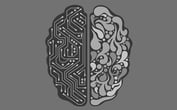 Ready or not, we’ve already begun living in the fourth industrial revolution: the age of artificial intelligence (AI), machine learning, robots, biotechnology, and smart devices. And in this new era, a lot of individuals are becoming concerned that robots will start stealing and destroying jobs across industries, replacing their human counterparts, and that they’ll eventually run everything in the world … or at the very least change the way that everything operates.
Ready or not, we’ve already begun living in the fourth industrial revolution: the age of artificial intelligence (AI), machine learning, robots, biotechnology, and smart devices. And in this new era, a lot of individuals are becoming concerned that robots will start stealing and destroying jobs across industries, replacing their human counterparts, and that they’ll eventually run everything in the world … or at the very least change the way that everything operates.
But is this the case for writers, or for people who write for a living? Will AI technology be able to replace writers? Maybe. However, before you answer this question, keep reading for more information about what you need to know about AI and writing in the new digital age.
What is AI?
Artificial Intelligence, according to Merriam-Webster, is “a branch of computer science dealing with the simulation of intelligent behavior in computers” and “the capability of a machine to imitate intelligent human behavior.”
Essentially, an artificially intelligent device or computer is one that is programmed in such a way that allows it to learn and imitate human behavior on its own. So, it really shouldn’t have come as a shock when we began programming devices to learn and write human language, because language (whether spoken, read, or written) is a critical component and driver of human behavior.
But could humans writing in human language become obsolete one day because of AI? And is AI a bad thing or a good thing when it comes to writing?
How AI Is Changing Writing
Here are some of the most notable ways AI is changing the world of writing.
Language Translation and Speech-to-Text
There is a plethora of programs that can translate written text into different languages instantaneously; for example, Google Translate. We also have popular word processing programs equipped with speech recognition capabilities that allow us to speak into a microphone and have a computer convert our speech into text for us. And while they still have some room for improvement, some speech recognition programs are becoming much more sophisticated and advanced than they once were. They often recognize accents, colloquialisms and slang, as well as improperly used phrases and terms.
Automatic Editing and Proofreading
There are quite a few editing and proofreading software options out there, and most of them try to check grammar mistakes. But they still won’t ever be able to replace editors and proofreaders. Read Grammar-Checking Software: A Quick Review for more information on what types of mistakes this type of software tends to miss and why.
Handwriting Detection
You can now place a handwritten document into a device that has handwriting detection software and the program will be able to decipher the words written on the page and convert them into typed text. The programs are intelligent enough to decipher different types of scribble too, and some can even convert cursive handwriting into typed text.
Plagiarism Detection
There are programs that can scan text in a typed document to see if it was plagiarized as it scans other search engines and online outlets. Such software can typically detect plagiarism in virtually any field or industry, including publishing, media, academia, visual art and design, and source code for computer programs and development.
Document Summaries
There are now AI programs that can summarize lengthy documents for you. And in a digital age of information overload, it will be a much-needed asset. They’ll scan any document and then summarize the text in short snippets for you to read, and they do this with surprising accuracy. The original AI algorithm was developed by researchers at Salesforce and is quickly taking off. This type of technology will revolutionize academia, research, government and policymaking, as well as how we study and understand medicine and the legal field, and so much more. Now writers, as well as those who write for a living, will be able to spend a lot more time writing documents than reading hundreds of pages in a variety of different and dense documents.
AI-Powered Journalism and Content Writing
Perhaps the most noticeable and concerning way that AI will change writing is via writing bots and chatbots. There are now programmed bots and systems that will begin to write breaking news stories and other types of content across the web, including a lot of marketing content and inbound content like blog posts and landing pages.
However, experts are saying that it is still highly unlikely robots will replace writers in this way altogether because readers still want to be entertained by and enjoy writing that’s produced by other humans. Writing that’s produced by humans typically has a better grasp of context and human emotion and thought than writing that’s produced by a robot. Recently there were even bots that tried to write a new chapter of Harry Potter using the voice and style of J.K. Rowling, and some poetry, and the results were actually pretty hilarious … and completely nonsensical.
Pros of Using AI for Writing
- Writers who use some of the AI technology listed above have higher levels of efficiency and overall accuracy when it comes to researching, writing, and reviewing documents.
- AI programs can free up humans to do what they do best: think, feel, provide context, be creative, etc. When humans don’t have to perform tedious tasks, they’ll be able to contribute more thought and skill into what they write and create.
- Intelligent computers and systems will come to understand what humans care about and what they want to read about, which will help writers create better and more relevant pieces of writing.
Cons of Using AI for Writing
- AI programs that are used for writing still have many limitations when it comes to language processing and comprehension and should never be used unmonitored.
- There still isn’t one single AI program that can handle all the functionalities mentioned above in this post, which means that writers will still need multiple programs to be able to benefit from all the functionalities of AI in writing listed above. And not only is this inefficient, it can end up costing a lot of money.
- AI programs still can’t replace the creativity and thought processes of humans who write.
What do you think about AI and writing? Do you think that writers will ever become obsolete or that they can be replaced by robots? Or do you think that AI will help writers be better at their craft? Share with us in the comments below.




